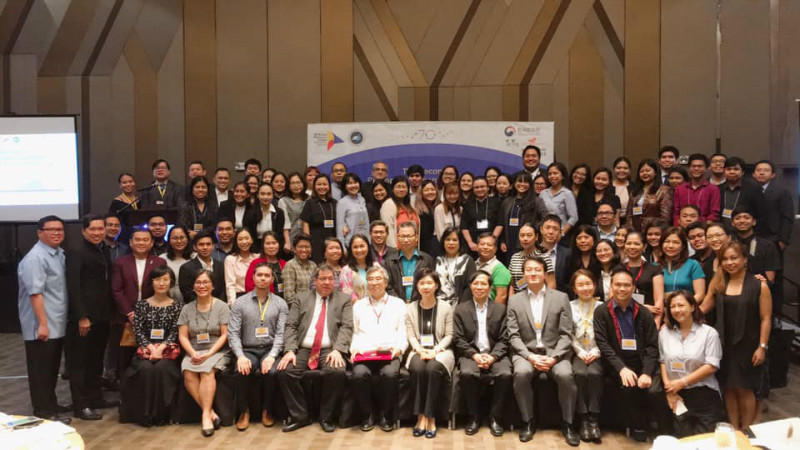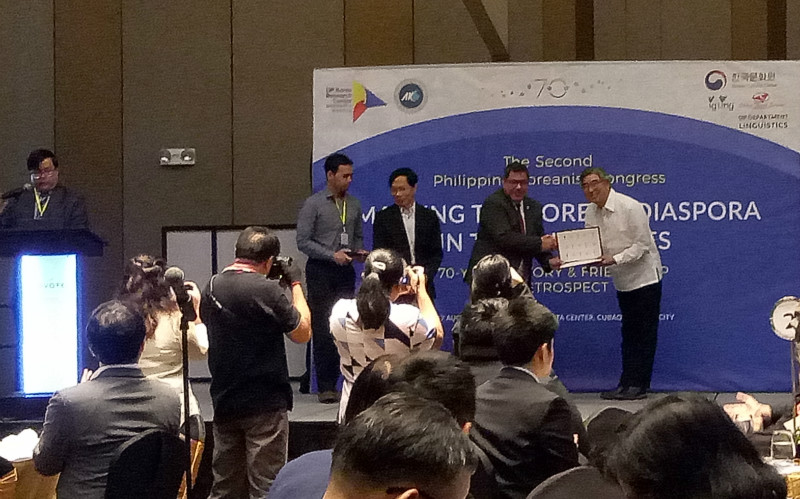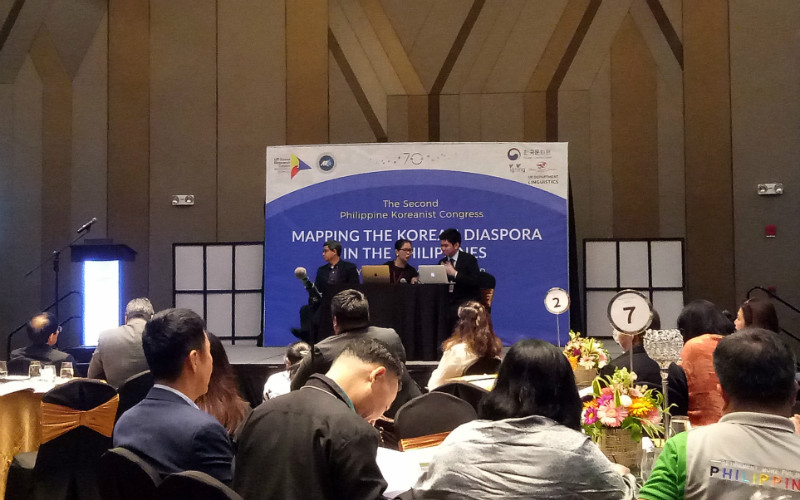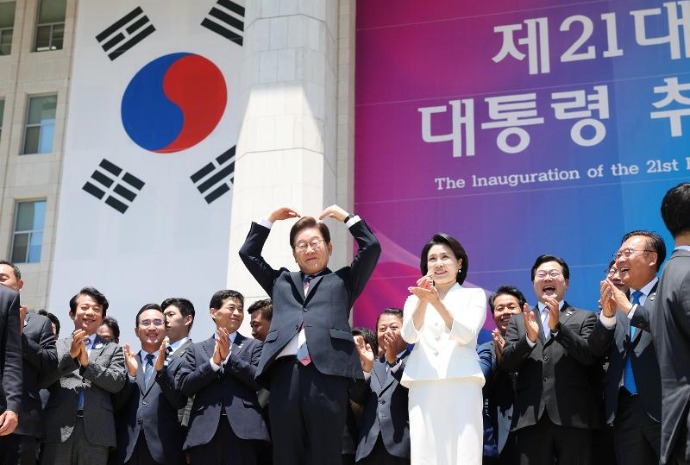View this article in another language
- 한국어
- English
- 日本語
- 中文
- العربية
- Español
- Français
- Deutsch
- Pусский
- Tiếng Việt
- Indonesian
By Honorary Reporter Diana Kassandra Almarez from the Philippines

A symposium on Korean studies supported by the Academy of Korean Studies on Aug. 17 was hosted at the Novotel Manila Araneta Center in Quezon City by the University of the Philippines (UP) Korea Research Center of UP-Dillman. The center is a think tank that promotes and develops the field of Korean studies in the Philippines.
The second Philippine Koreanist Congress, under the theme "Mapping the Korean Diaspora in the Philippines: 70-year History and Friendship in Retrospect," attracted scholars of Korean studies in the Philippines to form better partnerships and hold more insightful discussions on the issues, studies and policies related to the field.
The keynote speaker was Lee Chul-woo, a law professor at Yonsei University in Seoul and former director of the school's Institute of Legal Studies. Speaking on how diaspora engagement reshapes citizenship and nation-statehood, he said diaspora now applies to all immigrants and expats, with many countries developing diaspora engagement policies that incorporate economic and cultural activities such as remittances, investment and language education. He also discussed "ethnizenship," or "an external quasi-citizenship given to non-citizens on the basis of ethnic descent and perceived common ethnicity" determined by four major factors: language affiliation, ethnic origin and culture, geographic origin and past citizenship."

The first of the symposium's three sessions featured presentations under the theme "Immersion and Emergence of the Korean Community in the Philippines"; the second focused on the theme "Futuristic Partnership after 70 Years of Ties"; and the third was a Q&A for participants.
In the first session, Raymund Abejo, a history professor at UP-Diliman, presented his study "Discovering Korea from Modern Philippine History," discussing early contacts between both countries in the 17th and 19th centuries mainly through religion. In the 17th century, the Japanese daimyo (feudal lord) Takayama Ukon was exiled to Intramuros, Manila, along with other Korean Catholics in Japan including Pak Marina. In the 19th century, Saint Andrew Kim Taegon, an early Korean Catholic, studied theology in Bulacan. Abejo then discussed two Korean intellectuals, Ahn Chang-ho and Yeo Un-hyeong, who went to the Philippines and observed the country’s struggle for independence in the 1920s. Their impression of the Philippines under American colonial rule helped them in their struggle to achieve Korean independence from imperial Japan.
Next was sociology scholar Bubbles Beverly Asor from De La Salle University with her study "The Philippines as a Receiving Society and its Immigration Regimes: An 'Unlikely Home' for Korean Communities." She discussed Hallyu (Korean Wave) as an example of North-South migration resulting from migratory infrastructures for travel, tourism, English education, retirement and business. Her study said most Koreans in the Philippines have settled in Metro Manila, the provinces of Cavite, Laguna, Batangas, Rizal, Pampanga, Misamis Oriental and Aklan, and the cities of Baguio, Davao and Iloilo.
Antonio Emmanuel R. Miranda from the Foreign Service Institute, a think tank under the Department of Foreign Affairs, closed the first session with his study "Building Cross-Cultural Competence for People-to-People Ties: The Landscape of Korean Communities in the Philippines." Many Korean organizations are active in the Philippines, he said, such as the United Korean Community Association in the Philippines, the Cebu Korean Association, the Korean Chamber of Commerce in the Philippines and the Korean Veterans Association. Miranda also identified the strategies of ethnic Korean communities in the Philippines for cross-cultural competence such as conducting long-term and regular immersions in the Philippine community, maintaining their Korean identity and creating a goal-setting strategy.

The second session started with Normi Garcia-Son from the Kopino Children’s Association presenting her study "Korean-Filipino Marriage: Towards an Understanding of Interracial Longevity and Developing Key Policies." She identified several factors behind the longevity of five marriages between Filipinas and Koreans: first marriage, college education, middle-class household income, joint bank account, high level of independence, similar values and goals, high cultural sensitivity, strong adaptability, openness, religion, and the fluency of Pinay wives in English, Filipino and Korean. She recommended the opening of a multicultural school in the Philippines for education on Philippine culture and language and strengthening connections and continuous assistance to Filipino-Korean families through associations and government agencies.
Oliver John C. Quintana, a political science professor from Ateneo de Manila University, presented his study "A Brotherhood Kept Alive: Examining Korean Communities' Social Involvement in the Philippines and its Potential Role in Institutionalizing National Memory." Discussing the Korean War and the importance of the Philippine Expeditionary Forces to Korea (PEFTOK), he said the Philippines faces a "critical problem" in heritage preservation and promotion; the war's importance must be instilled in Filipinos to prevent this history from being forgotten since fewer Philippine war veterans remain alive, he added. Though several projects and programs to commemorate the war have been conducted, Quintana said permanent, updated and continuous education is crucial with the cooperation of the PEFTOK Veterans Association, Inc. (PVAI), the Philippine and Korean governments, cultural agencies, ethnic Korean communities in the Philippines and organizations.
Dani Rose C. Salazar, a business professor from UP-Diliman, closed the second session with her presentation on bilateral trade, with her study showing that Korea dominates two-way commerce with a large trade surplus with the Philippines.

To close out the symposium, Korea.net Honorary Reporter Diana Kassandra A. Almarez was asked what she thought was the most relevant topic in Korean studies among those presented. She chose the study on the Korean War and PEFTOK, calling heritage preservation an underestimated but pressing issue in the Philippines. She also gave several recommendations to cultural practitioners and policymakers. The recently sold-out Korean War Memorial Peace Concert at the Cultural Center of the Philippines is one of the best platforms to commemorate the war, she said, proposing more collaboration with Philippine cultural agencies to create effective cultural education. Almarez also suggested a permanent Korean War exhibition honoring Philippine soldiers, preferably within the National Museum, saying she got this idea after seeing a similar exhibition on World War II at the Edo-Tokyo Museum in Japan.
chaey0726@korea.kr
*This article is written by a Korea.net Honorary Reporter. Our group of Honorary Reporters are from all around the world, and they share with Korea.net their love and passion for all things Korean.

Participants of the second Philippine Koreanist Congress on Aug. 17 pose for a group photo at the Novotel Manila Araneta Center in Quezon City. (DZUP)
A symposium on Korean studies supported by the Academy of Korean Studies on Aug. 17 was hosted at the Novotel Manila Araneta Center in Quezon City by the University of the Philippines (UP) Korea Research Center of UP-Dillman. The center is a think tank that promotes and develops the field of Korean studies in the Philippines.
The second Philippine Koreanist Congress, under the theme "Mapping the Korean Diaspora in the Philippines: 70-year History and Friendship in Retrospect," attracted scholars of Korean studies in the Philippines to form better partnerships and hold more insightful discussions on the issues, studies and policies related to the field.
The keynote speaker was Lee Chul-woo, a law professor at Yonsei University in Seoul and former director of the school's Institute of Legal Studies. Speaking on how diaspora engagement reshapes citizenship and nation-statehood, he said diaspora now applies to all immigrants and expats, with many countries developing diaspora engagement policies that incorporate economic and cultural activities such as remittances, investment and language education. He also discussed "ethnizenship," or "an external quasi-citizenship given to non-citizens on the basis of ethnic descent and perceived common ethnicity" determined by four major factors: language affiliation, ethnic origin and culture, geographic origin and past citizenship."

Yonsei University professor Lee Chul-woo on Aug. 17 receives a certificate at the second Philippine Koreanist Congress in Quezon City. (Diana Kassandra Almarez)
The first of the symposium's three sessions featured presentations under the theme "Immersion and Emergence of the Korean Community in the Philippines"; the second focused on the theme "Futuristic Partnership after 70 Years of Ties"; and the third was a Q&A for participants.
In the first session, Raymund Abejo, a history professor at UP-Diliman, presented his study "Discovering Korea from Modern Philippine History," discussing early contacts between both countries in the 17th and 19th centuries mainly through religion. In the 17th century, the Japanese daimyo (feudal lord) Takayama Ukon was exiled to Intramuros, Manila, along with other Korean Catholics in Japan including Pak Marina. In the 19th century, Saint Andrew Kim Taegon, an early Korean Catholic, studied theology in Bulacan. Abejo then discussed two Korean intellectuals, Ahn Chang-ho and Yeo Un-hyeong, who went to the Philippines and observed the country’s struggle for independence in the 1920s. Their impression of the Philippines under American colonial rule helped them in their struggle to achieve Korean independence from imperial Japan.
Next was sociology scholar Bubbles Beverly Asor from De La Salle University with her study "The Philippines as a Receiving Society and its Immigration Regimes: An 'Unlikely Home' for Korean Communities." She discussed Hallyu (Korean Wave) as an example of North-South migration resulting from migratory infrastructures for travel, tourism, English education, retirement and business. Her study said most Koreans in the Philippines have settled in Metro Manila, the provinces of Cavite, Laguna, Batangas, Rizal, Pampanga, Misamis Oriental and Aklan, and the cities of Baguio, Davao and Iloilo.
Antonio Emmanuel R. Miranda from the Foreign Service Institute, a think tank under the Department of Foreign Affairs, closed the first session with his study "Building Cross-Cultural Competence for People-to-People Ties: The Landscape of Korean Communities in the Philippines." Many Korean organizations are active in the Philippines, he said, such as the United Korean Community Association in the Philippines, the Cebu Korean Association, the Korean Chamber of Commerce in the Philippines and the Korean Veterans Association. Miranda also identified the strategies of ethnic Korean communities in the Philippines for cross-cultural competence such as conducting long-term and regular immersions in the Philippine community, maintaining their Korean identity and creating a goal-setting strategy.

The speakers in the event's first session (from left to right) are Raymund Abejo, Bubbles Beverly Asor and Antonio Emmanuel Miranda. (Diana Kassandra Almarez)
The second session started with Normi Garcia-Son from the Kopino Children’s Association presenting her study "Korean-Filipino Marriage: Towards an Understanding of Interracial Longevity and Developing Key Policies." She identified several factors behind the longevity of five marriages between Filipinas and Koreans: first marriage, college education, middle-class household income, joint bank account, high level of independence, similar values and goals, high cultural sensitivity, strong adaptability, openness, religion, and the fluency of Pinay wives in English, Filipino and Korean. She recommended the opening of a multicultural school in the Philippines for education on Philippine culture and language and strengthening connections and continuous assistance to Filipino-Korean families through associations and government agencies.
Oliver John C. Quintana, a political science professor from Ateneo de Manila University, presented his study "A Brotherhood Kept Alive: Examining Korean Communities' Social Involvement in the Philippines and its Potential Role in Institutionalizing National Memory." Discussing the Korean War and the importance of the Philippine Expeditionary Forces to Korea (PEFTOK), he said the Philippines faces a "critical problem" in heritage preservation and promotion; the war's importance must be instilled in Filipinos to prevent this history from being forgotten since fewer Philippine war veterans remain alive, he added. Though several projects and programs to commemorate the war have been conducted, Quintana said permanent, updated and continuous education is crucial with the cooperation of the PEFTOK Veterans Association, Inc. (PVAI), the Philippine and Korean governments, cultural agencies, ethnic Korean communities in the Philippines and organizations.
Dani Rose C. Salazar, a business professor from UP-Diliman, closed the second session with her presentation on bilateral trade, with her study showing that Korea dominates two-way commerce with a large trade surplus with the Philippines.

Korea.net Honorary Reporter Diana Kassandra A. Almarez. (Diana Kassandra Almarez)
To close out the symposium, Korea.net Honorary Reporter Diana Kassandra A. Almarez was asked what she thought was the most relevant topic in Korean studies among those presented. She chose the study on the Korean War and PEFTOK, calling heritage preservation an underestimated but pressing issue in the Philippines. She also gave several recommendations to cultural practitioners and policymakers. The recently sold-out Korean War Memorial Peace Concert at the Cultural Center of the Philippines is one of the best platforms to commemorate the war, she said, proposing more collaboration with Philippine cultural agencies to create effective cultural education. Almarez also suggested a permanent Korean War exhibition honoring Philippine soldiers, preferably within the National Museum, saying she got this idea after seeing a similar exhibition on World War II at the Edo-Tokyo Museum in Japan.
chaey0726@korea.kr
*This article is written by a Korea.net Honorary Reporter. Our group of Honorary Reporters are from all around the world, and they share with Korea.net their love and passion for all things Korean.
